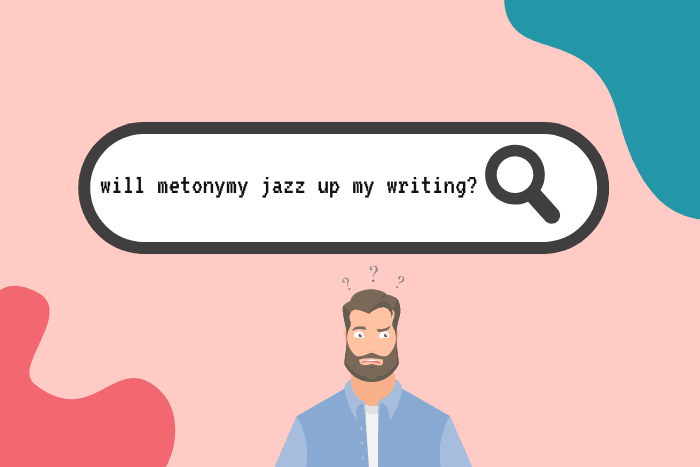Looking for some incredible metonymy examples to jazz up your writing?
Even though metonymy is all around us, it can be surprisingly difficult to come up with great examples of it.
That’s mainly because it’s a different word and concept that many people are unfamiliar with, including English majors.
Now, if metonymy has you stumped, you’ve come to the right place.
This guide will give you a crash course in metonymy and highlight 20 captivating examples of metonymy from everyday life, politics, pop culture, and more.
Ready to get started?
Then let’s kick things off with a quick definition!

What is Metonymy?
Metonymy involves using a single word as a stand-in for a related word or concept.
Put it another way, it’s when you substitute a ordinary word or phrase with another word or phrase that’s associated with it.
Some everyday examples of metonymy include calling your car your “ride” or declaring that lobster mac and cheese is your favorite “dish.”
Fun Fact: Metonymy comes from the Greek word metōnymía, meaning “a change of name.”
What’s the Difference Between Metonymy, Synecdoche, Metalepsis, and Metaphor?
Metonymy is similar to — and yet distinctive from — related literary devices like synecdoche, metaphor, and metalepsis.
Let’s a quick look at each of these terms:
Synecdoche vs Metonymy
Synecdoche is a form of metonymy where you take part of an object and use it to refer to the whole. So synecdoche is referring to your car as your “wheels” since they are a single part of your car, while “ride” is metonymy because it’s a related word that replaces the term car.
Metalepsis vs Metonymy
Next, we have metalepsis, a type of metonymy where a literal phrase is replaced with a figurative one. For example, consider the term “lead foot,” where two literal objects are brought together to create a new meaning — a person who’s fond of driving with a heavy foot on the gas pedal.
Metaphor vs Metonymy
Finally, we have metaphor, which compares the qualities of two unrelated things. So saying your child is the “apple of my eye,” describing yourself as a “night owl,” or referring to the year 2020 as a “dumpster fire,” are all examples of metaphor.
20 Metonymy Examples

Now that we’ve defined metonymy and explored its differences with related literary terms let’s dive into a few examples from everyday language, songs, politics, and English literature.
Examples of Metonymy in Everyday Language
Even though the term metonymy might sound fancy, most of us regularly use metonymy (and other types of figurative language) in everyday speech.
There’s a very good chance you’ve already used it dozens of times today without even realizing it!
Don’t believe me? Well, here are a few common examples of metonymy in action:
1. Elon Musk
“I’m a Silicon Valley guy. I just think people from Silicon Valley can do anything.”
2. Marlon Brando
“Most of the successful people in Hollywood are failures as human beings.”
3. Lance Morcan
“The media, like anything else, can be bought. Everything, it seems, has its price. Even the free press.”
4. Carl Safina
“The coast is an edgy place. Living on the coast presents certain stark realities and a wild, rare beauty.”
5. Laura Hilenbrand
“I think authors can get into a lot of trouble viewing the subject matter as their turf.”
Examples of Metonymy in Songs
Songwriters have long recognized the value of metonymy, and it’s often used in popular songs.
As these examples show, metonymy is a powerful tool for conveying deep emotions, such as expressing a longing for tolerance and harmony, a desire to experience true love, and staying with a difficult person out of love.
6. Paul McCartney & Stevie Wonder
“Ebony and ivory
Live together in perfect harmony
Side by side on my piano keyboard
Oh lord, why don’t we?”
7. Neil Diamond
“Stones would play inside her head.
And where she slept, they made her bed.
And she would ache for love and get
But stones.”
8. John Legend
“What would I do without your smart mouth?
Drawing me in, and you kicking me out
‘Cause all of me
Loves all of you.”
Examples of Metonymy in Politics

Even politicians have a strong appreciation for metonymy, as well as colorful rhetoric, power words, and figurative language.
But metonymy isn’t confined to political speeches. People also use it when referring to the U.S. government as Washington or the White House, or the British monarchy as the Crown.
9. Tom Brokaw
“When he entered the Oval Office — by fate, not by design — Citizen Ford knew that he was not perfect, just as he knew he was not perfect when he left. But what president ever was?”
10. Harry S. Truman
“You want a friend in Washington? Get a dog.”
11. John W. Vessy
“More has been screwed up on the battlefield and misunderstood in the Pentagon because of a lack of understanding of the English language than anything else.”
12. Queen Elizabeth
“God has given such brave soldiers to this Crown that, if they do not frighten our neighbors, at least they prevent us from being frightened by them.”
Examples of Metonymy in Literature
Given that metonymy is a literary device, you won’t be surprised that many works of literature liberally use it.
You can find countless examples of metonymy in famous literary works, including Shakespeare’s Julius Caesar and American classics like Moby Dick and Huckleberry Finn.
As you’ll see, Shakespeare, with his gift for coining new phrases, gives us many ingenious examples of metonymy.
13. William Shakespeare, Julia Caesar
“Friends, Romans, countrymen, lend me your ears.”
14. William Shakespeare, Hamlet
“To die, to sleep — No more — and by a sleep to say we end the heartache and the thousand natural shocks that flesh is heir to — ’tis a consummation devoutly to be wished.”
15. Hermen Melville, Moby Dick
“You must know that in a settled and civilized ocean like our Atlantic, for example, some skippers think little of pumping their whole way across it; though of a still, sleepy night, should the officer of the deck happen to forget his duty in that respect, the probability would be that he and his shipmates would never again remember it, on account of all hands gently subsiding to the bottom.”
16. Mark Twain, The Adventures of Huckleberry Finn
“I went and told the Widow about it, and she said the thing a body could get by praying for it was ‘spiritual gifts’.”
17. William Shakespeare, All’s Well That Ends Well
“I know a man that had this trick of melancholy sold a goodly manor for a song.”
Other Famous Examples of Metonymy
We’ve looked at several metonymy examples so far, and they’ve taken us from Shakespeare and Queen Elizabeth I to Elon Musk and John Legend.
Of course, metonymy isn’t limited to politics, literature, and music, so let’s take a look at a few other famous examples:
There are many examples of metonymy in the titles of films and TV shows, including:
“House of Cards,” “Golden Girls,” and “Rags to Riches.”
And plenty of famous quotes and sayings also make good use of metonymy.
Consider this immortal phrase from Edward Bulwer-Lytton:
“The pen is mightier than the sword.”
And last but not least, we can’t forget that famous wordsmith (and Prime Minister) Winston Churchill, who gave us this powerful reminder to keep going even in the worst of times:
“If you’re going through hell, keep going.”
Why Use Metonymy?

Sure, metonymy is a pretty neat way to use language, but do you really need it to write well?
Not necessarily, but there are still a few good reasons why writers might use it.
For one thing, it’s an incredible opportunity to exercise creativity. As writers, we’re naturally drawn to new ways of using language, and metonymy provides us with a whole new dimension of creative expression and literary symbolism,
Metonymy also allows you to infuse deeper meaning into a seemingly ordinary word, transforming a simple word like “pen” into a striking representation of the power of the written word.
Metonymy can also help you be more concise in your writing, facilitating a reduction in filler words. You see, metonymic phrases are often short and to the point, making your sentences more powerful and profound.
TLDR; metonymy adds more snap and crackle to your writing, making it more meaningful and memorable to readers.
Ready to Create Your Own Amazing Metonymy Examples?
Metonymy might sound complicated, but it’s actually very accessible and something that most people use in their everyday speech.
After reading this post, you should have a clear understanding of what metonymy is and how it’s used.
Now it’s time to draw on your newfound knowledge and start using metonymy in your writing.
So I challenge you to give metonymy a shot and use it two or three times in your next writing project.
Keep it up, and you’ll be a master of metonymy before you know it.
The post 15+ Metonymy Examples That Will Sweep You Off Your Feet appeared first on Smart Blogger.

No comments:
Post a Comment